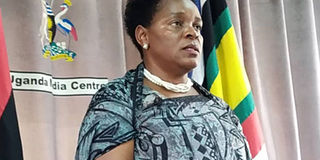Minister warns traditional doctors over COVID-19 treatment

The Minister of State for Gender and Culture Affairs, Ms Peace Mutuuzo. FILE PHOTO
What you need to know:
- AFP has debunked more than 140 cases of widely-shared misinformation since the virus emerged in December, including fake hotline numbers, recipes for herbal "cures" and videos of packed supermarkets which were actually filmed years ago.
The Minister of State for Gender and Culture Affairs, Ms Peace Mutuuzo, has warned herbalists and traditional doctors against trying to treat patients with symptoms of coronavirus as misinformation continue to impact on efforts to quell the pandemic.
She said 60 percent of Ugandans still use traditional medicine to treat their diseases.
“Traditional healers and herbalists should refer all patients with symptoms of coronavirus to health facilities for further management. This is a new disease that we know very little about,” she said.
Ms Mutuuzo urged people operating children homes to observe the Standard Operating Procedures and guidelines placed by Ministry of Health.
“We have a tendency of keeping on alert for short time and if we see nothing happening we revert to our norms,” the minister said.
“This is not business as usual. We should strongly adhere to hygiene practices to shorten our journey of preventing the spread of coronavirus,” she added.
Ms Mutuuzo also urged people at the borders to report strangers and hand them over to authorities so that they can be handled properly to prevent the spread of the pandemic that has claimed thousands and infected hundreds of thousands across the world.
Experts on Friday warned that misinformation is impacting on efforts to quell the coronavirus pandemic as even "very well educated" people share false cures, hoaxes and conspiracy theories online.
The World Health Organization (WHO) has increased its efforts to tackle myths and rumours since it warned in February of a massive "infodemic", a deluge of information, including false claims that can risk public health.
AFP has debunked more than 140 cases of widely-shared misinformation since the virus emerged in December, including fake hotline numbers, recipes for herbal "cures" and videos of packed supermarkets which were actually filmed years ago.
One message circulating on the popular WhatsApp messaging service recommended taking a dangerously high dose of anti-malaria drug chloroquine to treat COVID-19.
And a Facebook post apparently written by a medical student that advised drinking warm water and lemon to prevent the disease was shared more than 40,000 times around the globe.




